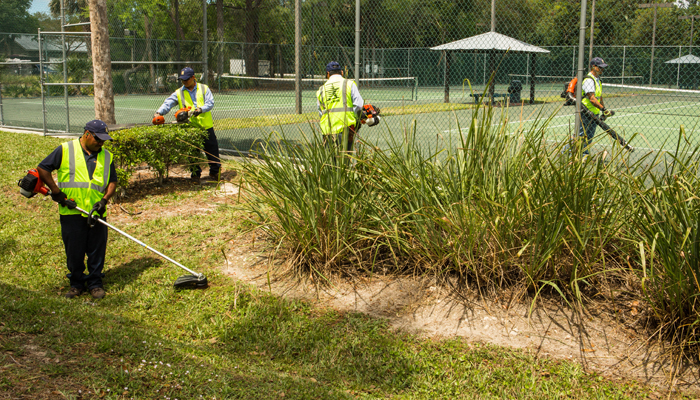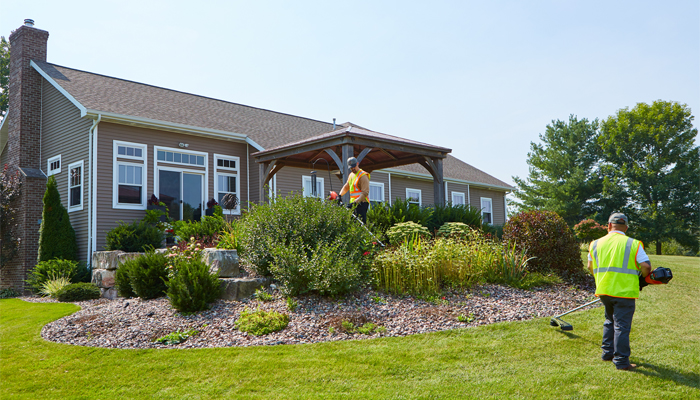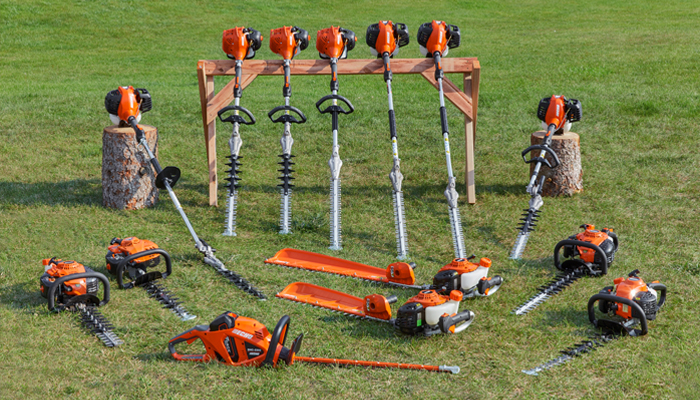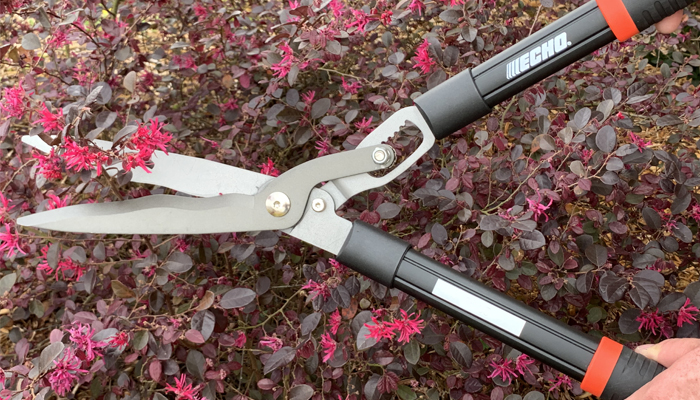Must-Have Equipment for a Landscaping Business
Starting and running a successful landscaping business requires more than just being passionate about the outdoors. You’ll also need to be willing to invest in tools and equipment that guarantee efficiency, quality, and longevity.
Owning the right landscaping business equipment makes all the difference in building a profitable business with happy customers because you’re able to meet deadlines, manage large projects, and consistently deliver professional results.
For landscapers just starting out – or for those ready for an equipment upgrade – our comprehensive list of must-have tools for your landscaping business can boost productivity and profitability. Read on to learn about the equipment you need to start a landscaping business.

General Considerations
Before choosing any new tools or equipment, there are several considerations to think about.
- Power source: Do you prefer battery-operated or gas-powered tools? Battery-operated tools can be lighter in weight, but may not have the run-time that gas powered tools do.
- Property size: Are you typically working in large property or commercial spaces or are most of your clients small to mid-sized residential yards? The caliber of your tools and equipment should be up to the job.
- Frequency of use: Do you use your equipment and tools daily? Several times a week? How often your tools are used will help you determine the quality you should be looking at.
- Ergonomics: Especially if you work most days and long hours, you and your crew should be as comfortable as possible.
Lawn Mower
A reliable lawn mower is essential for any landscaping business. Although its primary function is to cut grass, mowers do much more than just trim lawns – they represent the quality of your services overall.
A well-manicured lawn speaks to your landscaping abilities, creating curb appeal and making a positive first impression for residential and commercial properties. The right lawn mower helps you achieve the polished, professional look your customers expect.
Tips for choosing the right lawn mower:
Choosing which lawn mower you need depends on the scale of your operation and the types of properties you service. Before you purchase a one, think about the following:
Power source: Mowers today come in battery-powered or gas-powered options. Deciding which style best aligns with your needs is essential.
- Battery-powered: Battery-powered mowers are lightweight, agile, and require less maintenance. They are also easy to maneuver and quieter than their gas-powered alternatives making them ideal for noise sensitive areas.
- Gas-powered: Gas-powered mowers offer increased power, durability, and longer runtimes; can be ideal for large properties or heavy-duty jobs.
Average property size: Small to medium-sized lawns don’t necessarily need a riding mower; however, if you regularly service large properties, mow multiple lawns each day, or have commercial contracts, riding mowers might be more efficient and cost-effective in the long run.
Land: Terrain plays a role in the type of lawn mower you should get. Flat terrain doesn’t need much more than your basic, standard mower. Hilly or uneven ground may require something with a higher horsepower or enhanced stability features.
Frequency of use: If you have a high-volume business and you use a mower several times a day, investing in a commercial-grade option with durable components and a larger fuel tank might be smart.
Budget: Initial costs are generally a factor when investing in or upgrading equipment for your landscaping business. But considering long-term benefits is also important. A high-quality mower will ultimately increase productivity, giving you the power to take on more jobs and bring in more revenue.
Trimmer / Edger
As a landscaper, attention to detail is critical if you hope to create that polished, professional look your customers want. A high-quality trimmer or edger helps you get clean edges, define borders, and trim hard-to-reach areas. The right trimmer means every project you touch looks meticulously maintained.

Tips for choosing the right trimmer or edger:
When deciding which trimmer or lawn edger to invest in, considering the following factors will help you get the best tool for your business needs. Power and runtime are important considerations that can help you determine whether you should opt for a battery- or gas-powered tool.
Power source: While choosing a power source is largely based on personal preference and needs, there are some differences that can help you decide.
- Battery-powered: Combines mobility and convenience that balances power and ease of use. Look at voltage and battery life to see if a tool will be adequate for your needs.
- Gas-powered: Gas may be better if you consistently perform heavy-duty jobs. The engine size – measured in cubic centimeters (CC) – gives you an idea of how much power a tool will have.
Mobility and ease-of-use: Think about weight and ergonomics. If you’re concerned about reducing operator fatigue, needing comfort for extended use, or wanting precise control, look for a lightweight tool that has features like adjustable handles and shafts.
Attachments and versatility: Note what attachments come with the tool you’re considering. Some double as edgers, brushcutters, or even pole saws. Having versatility like this is cost-effective and can allow you to expand your toolset without incurring the expense of investing in multiple tools needed for a landscaping business.
Blower
A leaf blower is essential when it comes to landscaping business equipment. Blowers are an efficient solution that allow you to quickly clear debris, grass, and leaves from yards, walkways, garden beds, and driveways.
Tips for selecting the right leaf blower:
Think about the following features and functionality before deciding which leaf blower best fits your needs.
Airspeed and airflow: The higher an airspeed and airflow rating is, the more vigorous a blower’s performance will be. If you need to blow heavy-duty jobs, look for high cubic feet per minute (CFM) and high miles per hour (MPH) ratings.
Noise level: For landscaping businesses primarily made up of residential customers, a low-noise blower can minimize disturbances.
Ergonomics for comfortable use during extended periods: Since blowers are typically used for extended periods, investing in a high-quality, ergonomically designed tool is generally well worth it.
Power source: Like any power tool today, deciding on the best power source is based on your needs.
- Battery-powered: Offers balance between power and mobility; versatile and convenient.
- Gas-powered: Can be more powerful for large areas offering greater productivity and efficiency.
Hedge Trimmer
Hedge trimmers are important tools for a landscaping business. A high-quality trimmer lets you quickly and consistently deliver professional, and impressive results. It also means you can shape and maintain hedges, shrubs, and bushes more efficiently and precisely.

Tips for choosing the right hedge trimmer:
When you choose your hedge trimmer, the following factors ensure optimal performance and comfort.
Blade length and type: Blade length plays a significant role in determining which trimmer is best.
- Short blades: Good for precise trimming and detailed work.
- Longer blades: Ideal for larger hedges or areas; allows for quick trimming and extended reach.
- Single-sided blades: Offer control and safe operation for less experienced users.
- Double-sided blades: Fast trimming with double-sided cutting; great for professional use.
Power source: Again, you want to determine which power source will best suit your needs.
- Battery-powered: Choose models known for long-lasting batteries so you can work uninterrupted with robust mobility that gets the job done.
- Gas-powered: Some gas models are heavier and noisier; may be more adequate for large properties and tasks or extensive landscapes.
Ergonomics and weight: Lightweight models with adjustable handles and comfort grips can reduce operator fatigue during prolonged use. Ergonomically designed trimmers offer precision and control for the best overall performance with comfortable use.
Sprayer
Sprayers are critical for efficiently applying fertilizers, herbicides, pesticides, and other chemicals for lawn care, pest control, and plant health management.
Tips for choosing the right sprayer:
If you need a new commercial-grade sprayer, comparing features and quality will ensure you get a consistent, precise, powerful application with every use.
Adjustable nozzle: The ability to change spray patterns and flow rate lets you handle various tasks, from broad lawn treatment to targeted applications.
Comfortable straps: Backpack sprayers should have padded, adjustable straps to evenly distribute weight across your shoulders and back and reduce fatigue.
Durability: Sprayers made from high-quality, chemical-resistant materials are more durable. Check for strong seals and gaskets to prevent leaks and withstand corrosion.
Pump style: Manual pumps are cost-effective and suitable for small areas or precise applications. Battery-powered pumps offer convenience and can reduce fatigue if you spray larger areas or use your sprayer frequently.
Hand Tools
Every landscaper relies on well-made and strong basic hand tools to help them do their job. From planting to preparing soil to pruning, hand tools are versatile and ensure the accuracy that some power tools can’t.
Hand tools every professional landscaper needs:
- Shovels
- Rakes
- Pruners
- Hoes
- Trowels
- Garden forks
- Spades
- Loppers
- Hand saw
- Weeder
- Edging tool
- Bulb planter
- Cultivator

Tips for selecting the right hand tools:
Look for high-quality, ergonomically designed tools that help you work efficiently and comfortably so you can deliver the best results and enhance customer satisfaction.
Material quality: High-carbon or stainless steel tools are durable, rust-resistant, and hold sharp blades longer. Handles made from hardwood, reinforced plastic, or fiberglass are stronger and long-lasting for use season after season.
Design: You want ergonomic designs with comfortable, well-balanced grips. Lightweight tools are easier to handle and don’t cause strain, even after prolonged use.
Durability: Sturdy, solid construction is essential when selecting landscaping tools. Welded joints and securely attached handles will continue to perform for years. Brands with stellar warranties reflect confidence in a product’s ability to withstand the test of time.
Functionality: Tools with interchangeable heads or a multifunctional design are great for versatility and value. Specialized features like ratcheting mechanisms for accessibility, more robust cutting, and cushioned grips for added comfort are also bonuses to be on the lookout for.
Wheel Barrel or Garden Cart
Wheelbarrows or garden carts are essential for clearing or hauling heavy materials, plants, clippings, or equipment across a job site. They can significantly reduce physical strain and enhance productivity.
Tips for selecting the right wheelbarrow:
Think about the following when you choose a wheelbarrow or garden cart.
Capacity: What volume capacity will you generally need? Larger capacity carts can be used for bulk materials, while smaller ones are ideal for lighter loads.
Weight limit: Check the weight limit and make sure it can handle your typical load – if you have demanding tasks, you might want to get a heavy-duty model.
Material: Steel, polyethylene, or aluminum are common wheelbarrow materials. Steel is the most heavy-duty material, but it’s also heavier and can rust if not correctly maintained. Polyethylene and aluminum are both lightweight and rust-resistant, but they may not be quite as durable as steel models.
Wheel configuration: Traditional, single wheelbarrows offer maneuverability in tight spaces but require more balance and control. Two-wheel options are suitable for heavy loads and provide more stability. Four-wheel garden carts are also available and are easy to push or pull with the highest stability.
Wheelbarrow or Garden Cart
Wheelbarrows or garden carts are essential for clearing or hauling heavy materials, plants, clippings, or equipment across a job site. They can significantly reduce physical strain and enhance productivity.
Tips for selecting the right wheelbarrow:
Think about the following when you choose a wheelbarrow or garden cart.
Capacity: What volume capacity will you generally need? Larger capacity carts can be used for bulk materials, while smaller ones are ideal for lighter loads.
Weight limit: Check the weight limit and make sure it can handle your typical load – if you have demanding tasks, you might want to get a heavy-duty model.
Material: Steel, polyethylene, or aluminum are common wheelbarrow materials. Steel is the most heavy-duty material, but it’s also heavier and can rust if not correctly maintained. Polyethylene and aluminum are both lightweight and rust-resistant, but they may not be quite as durable as steel models.
Wheel configuration: Traditional, single wheelbarrows offer maneuverability in tight spaces but require more balance and control. Two-wheel options are suitable for heavy loads and provide more stability. Four-wheel garden carts are also available and are easy to push or pull with the highest stability.
Safety Gear
Safety gear is a critical component of your landscaping business. The right gear protects you and the people who work for you from hazardous materials and environments. Gloves, safety glasses, ear protection, and cut-resistant clothing prevent injuries caused by sharp objects, flying debris, and loud noises.
Tips for selecting high-quality safety gear:
Investing in high-quality safety gear ensures the well-being of your team and enhances productivity. Look for gear that meets industry standards for comfort and durability.
- Safety gloves: Gloves should be made from durable materials, like leather, synthetic leather, or cut-resistant fabric.
- Safety glasses: Select glasses that meet ANSI Z87.1 impact resistance standards to protect against flying debris. If you work outdoors, UV protection is also essential.
- Hearing protection: Ear protection should be comfortable and have a high Noise Reduction Rating (NRR). Earplugs generally offer an NNR between 20 and 30 dB(A) rating, and earmuffs can have even higher ratings.
Professionals Go to ECHO for Every Landscaping Need
Building a successful and profitable business relies as much on your tools as on your talent and skills. The right equipment for your landscaping business makes your job easier and more efficient, with better results that please your customers, season after season. From your lawn mower to your hand tools and safety gear, investing in reliable, high-quality tools helps you build a thriving landscaping business, ensuring long-term growth and a company you can be proud of.
ECHO has all your landscaping equipment needs – check out our selection to buy or upgrade the tools you rely on every day.
